Michelangelo Pistoletto, Cittadellarte’s director Paolo Naldini and over 70 Rebirth ambassadors with their coordinator Saverio Teruzzi, these are a few of the protagonists of the annual meeting of the Rebirth/Third Paradise ambassadors, which took place in Pistoia. As mentioned in a previous article, on Sunday 1st October a meeting was held on the topic of demopraxy as its fil rouge. What was the objective of the event? Paolo Naldini himself explained that introducing the meeting. “There are two interconnected objectives. The first is getting the ambassador together, which can happen informally or through the working tables, where everybody has the opportunity to introduce themselves and meet the others. The second is answering the question “How can the working sites of demopraxy work and be structured?”.
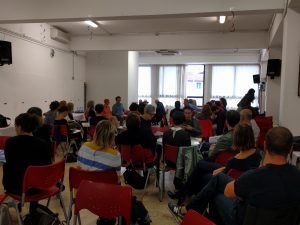
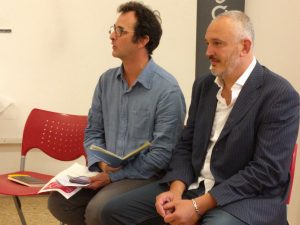
“In spite of the difficulties in networking the embassies – continued Saverio Teruzzi –, it’s gratifying to see the collaborations developing among them. The validation is in the numbers: this year we have organized over 800 events involving over 2 million conscious participants. This awareness is fundamental within the projects, because it means that whoever takes active part in them is familiar with the meanings of the symbol”. After the first speeches of the day, Michelangelo Pistoletto, together with Pistoia’s ambassadress Chiara Belliti, presented his new book, more accurately defined as his last manifest, “Ominiteism and Demopraxy”. This was an encore, since the day before the artist from Biella had already walked an audience through the chapters of his book at Palazzo dei Vescovi, also in Pistoia (as per previous article). From Pistoletto’s new work to the Third Paradise: Laura Salas, ambassadress from Havana, presented the third edition of the Cuban Forum.
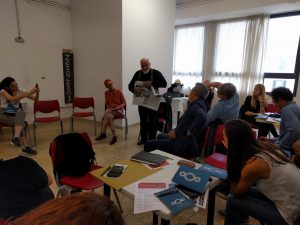
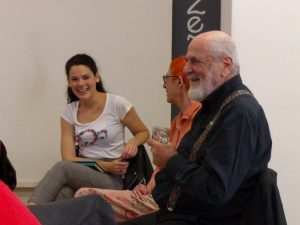
After the speeches, the participants moved to the practice with the start of the working tables. This context saw the emergence of the need for a dialogue among the ambassadors, in an exchange which highlighted the sense of the activities of each embassy, analysing limits and issues. Thanks to the plenary, everybody was able to benefit from the suggestions and possible solutions by the other presents.
In the afternoon, the people in charge of each table presented the themes and objects of their discussions to the other ambassadors.
The presentation of the first table had the facilitator Michela Querci, psychologist and coordinator of social inclusion activities with Arké, as its spokesperson: “We discussed the future of the Third Paradise as a community, naming what emerged with a synthetic title, which is ‘Conve(i)nzione’ (a play on words between the Italian for “convention” and “certainty”), to be intended like a convention among ambassadors and embassies to give structure to the methodologies, the work done and what could be done. We talked about practical instances and reflected on the potential usefulness of having a physical or virtual place where to share knowledge among embassies. During the debate, we discovered a need to extrapolate virtuous examples but also mistakes not to be repeated”.
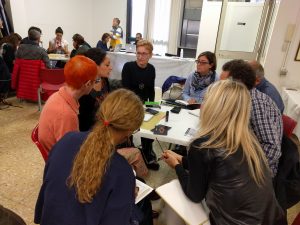
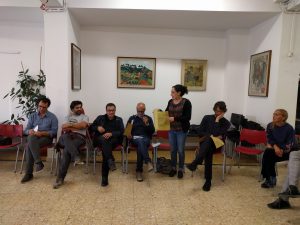
The next presentation was by Maurizio Federici, coordinator of some of Arké’s education to work workshops: “The title we’ve given to our debate is ‘Systematicity’, since, in order for a working site to expand, you need to structure the information you dispose of. We therefore think it’s fundamental to be able to access a platform (on line or on paper) highlighting the process in question, explaining what has been done in the course of a particular initiative. Sharing the projects in a systematic way seems to be essential: if an event works on a territory, we can draw from it, thanks to the documentation presenting it. Another aspect we talked about is about the Forums themselves. Starting from the interdisciplinary ones and from the working sites, the next step could be the organization of Forums more specifically themed than the previous ones”.
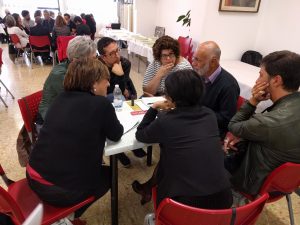
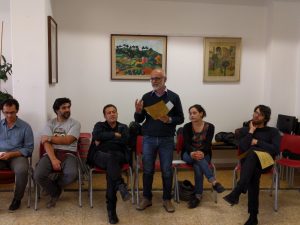
The third speech was by Michele Cerruti But: “In our case, the experiences of the actual participants in the table generated the topics of discussion. In our opinion, three are the questions that issue if the Third Paradise identifies itself as a political theme,: resources, continuity and methodologies. By “resources” we mean both projects and people, the ones consistently working on them. And this continuity is also fundamental, inasmuch as a proposal must be able to produce long term effects, imagining a transformation further on in the future. The methodology, on the other hand, is about the relationships among the actors at the table, with the institutions (quite relevant, also because in a position to finance the projects) and with everybody else.
In brief, not only the economic resources, but also the human ones must be seen as fundamental, which is the answer to all three questions”.
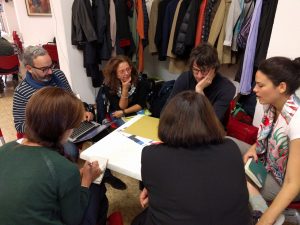
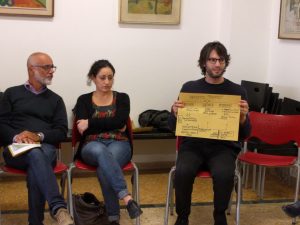
“We analysed how to structure a working site – said Roberto Mollica, the facilitator of another table –. We drafted a “decalogue” to find an answer: a working site agenda, since a working site, to be well organized, must have its own modus operandi with defined objectives and methods; an awareness of its own role, for which you need certain skills (if the group doesn’t have the relevant ones, an external expert must be consulted); the identification of opportunities and strategies; sustainability; consistency; the enhancement of specificities, i.e. being able to appreciate the added values of differences; internal and external communication; profiling and acquaintance among the ambassadors, since it is essential that they network; art as the aggregating element.
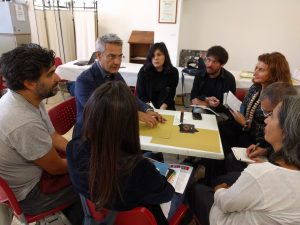
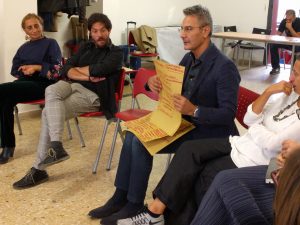
The Rebirth/Third Paradise ambassadress Alessia Siligardi highlighted the contents of her table. “We focused on how to develop the working sites of demopraxy. We think we should start from actual physical places, salvaging abandoned buildings for example. This way, not building new ones, we would also safeguard the environment. There’s a lot of potential, but also quite a few problems, mainly on a bureaucratic level. How do you face them? Through a network system based on trust and responsibility, with people promoting knowledge and relationships. These spaces should then be made public for this objective, creating microcosms of social utility without the need for bids”.
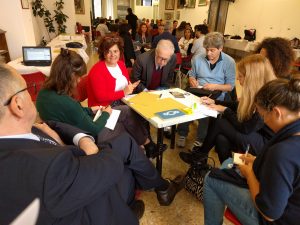
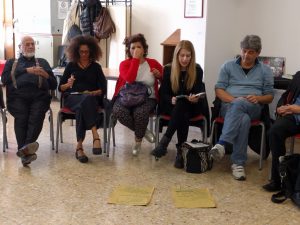
Valeria Cantoni illustrated the contents of the last table: “It would be useful that the working sites acknowledged their belonging to a sort of community, and that they worked in a uniform – or at least easily identifiable – dimension. We suggested the idea of a study dealing with funds for arts inherent to social change. In a project like this, we could adequately manage public and private funds intended for artistic projects. We also debated on the theme of “demopraxy”, wondering if the term “citizenry” might be more appropriate than “people”, since citizens – identifying themselves as such – would feel more responsible and make the working sites work better as a consequence. We closed with the proposal of including a certain number of under-20s in the Forums, with the idea of creating a “registry of ideas” to give whoever has the means to realize them the opportunity to do so, along the lines of Let Eat Bi and its Ethical Registry”.
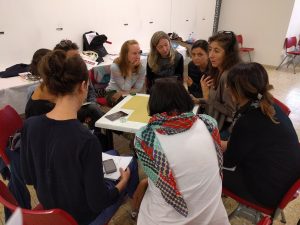
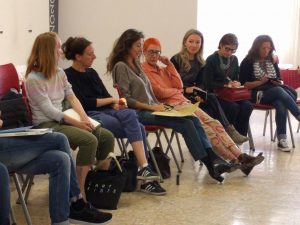
All the contributions will be considered and analysed as inputs for new operations. This first phase seems to indicate to a change in the Forums though. Pistoletto himself noticed how this time the process had been inverted compared to previous instances, when the Forums had marked the starting point for a working site, and not the other way round. This might lead to the development of themed sub-Forums post-working sites (as explained by Federici in his speech).
Can this be a new beginning?

